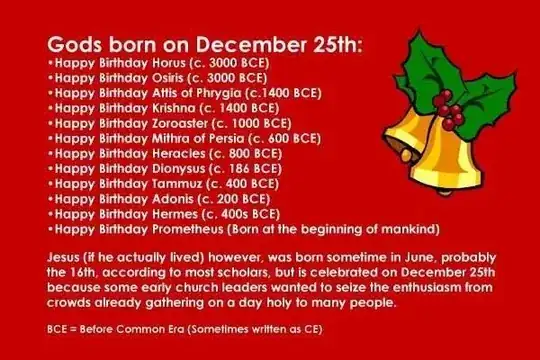I got this in my Facebook timeline today and it seems to be viral
Gods born on December 25th:
- Happy Birthday Horus (c. 3000 BCE)
- Happy Birthday Osiris (c. 3000 BCE)
- Happy Birthday Attis of Phrygia (c. 1400 BCE)
- Happy Birthday Krishna (c. 1400 BCE)
- Happy Birthday Zoroaster (c. 1000 BCE)
- Happy Birthday Mithra of Persia (c. 600 BCE)
- Happy Birthday Heracles (c. 800 BCE)
- Happy Birthday Dionysus (c. 186 BCE)
- Happy Birthday Tammuz (c.400 BCE)
- Happy Birthday Adonis (c. 200 BCE)
- Happy Birthday Hermes (c. 400s BCE)
- Happy Birthday Prometheus (Born at the beginning of mankind)
Jesus (if he actually lived) however, was born sometime in June, probably the 16th, according to most scholars, but is celebrated on December 25th because some early church leaders wanted to seize the enthusiasm from crowds gathering on a day holy to many people.
BCE = Before Common Era (Sometimes written as CE)
We have already shown that we don't know when Jesus was born, thus the claim that he was born in June is false. On the other hand, the claim that the Christian celebration of Christmas falls on a pre-existing holiday seems correct.
What about the rest of the image? How many of these deities' birthdays were celebrated at Christmas†?
† Let's paraphrase the claim as "a bunch of other deities' nativities were celebrated at Christmas, such as these". For this reason:
(a) any deity in the list above whose birthday was believed to be or celebrated around the winter solstice, or Christmas or New Year's eve should count as "close enough"
(b) I'd like to see the overall stats in a single answer (finding one which doesn't fit does not disprove the claim)
